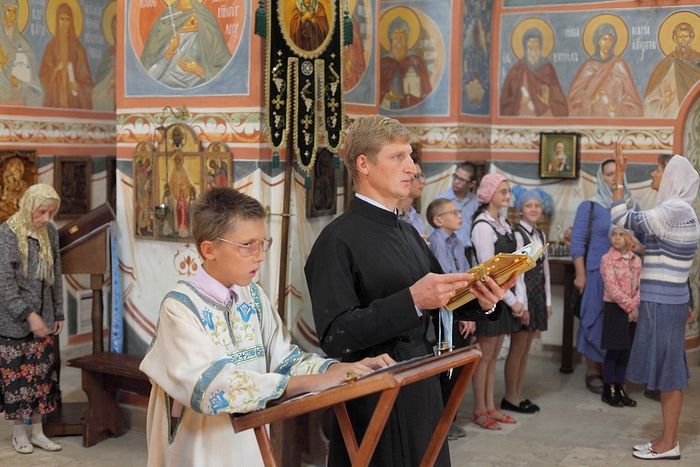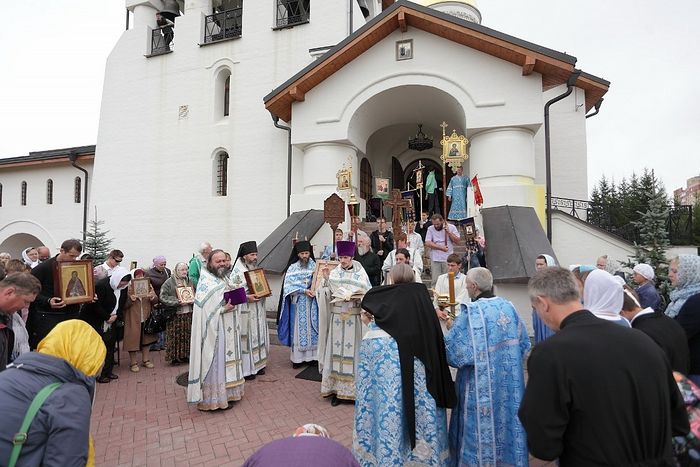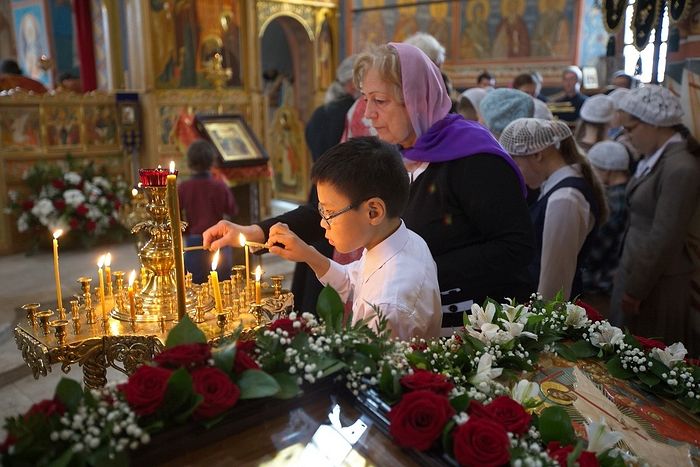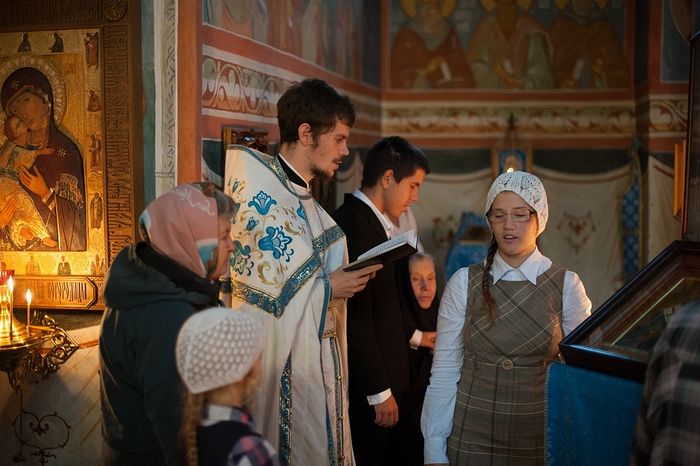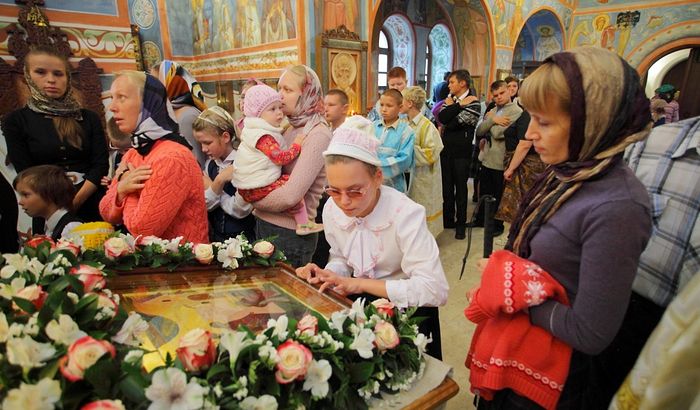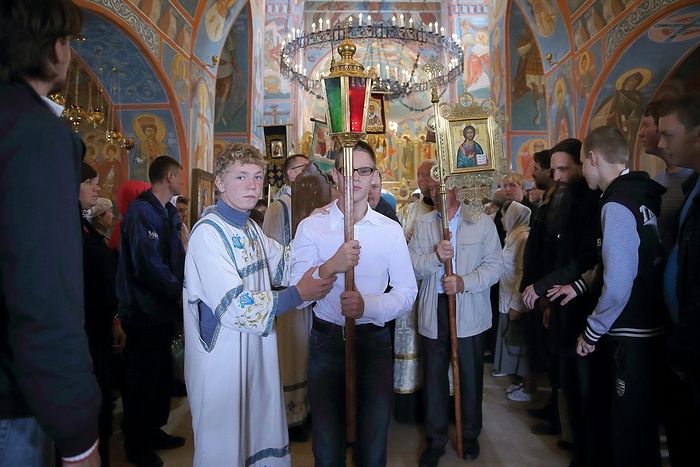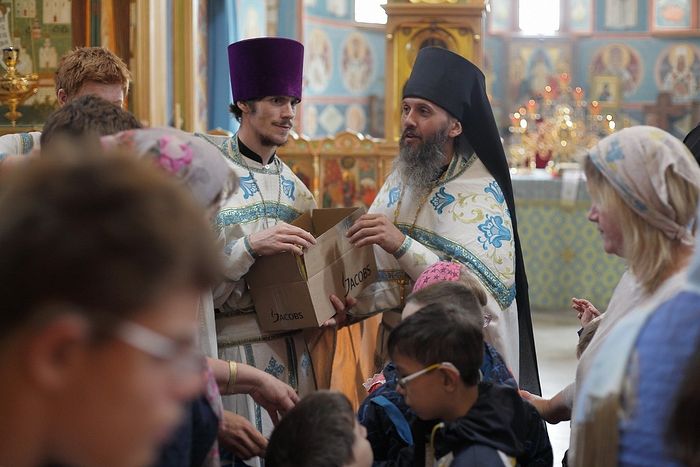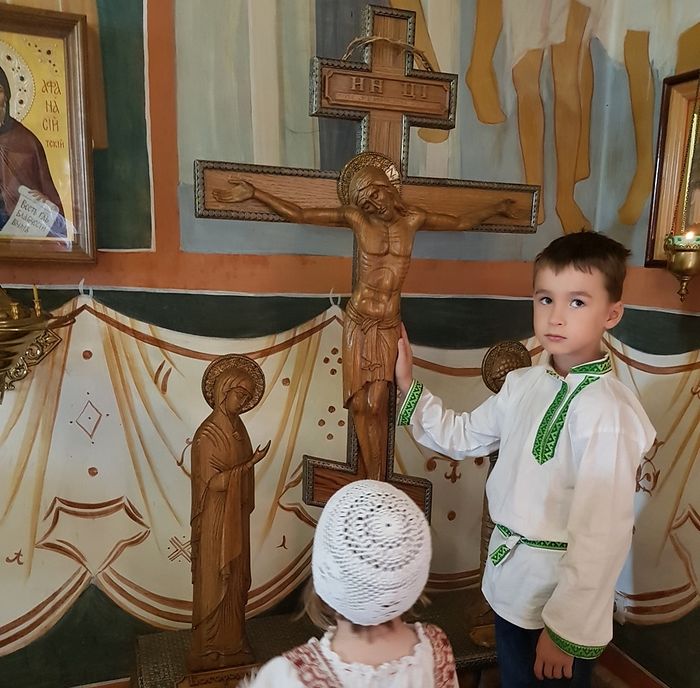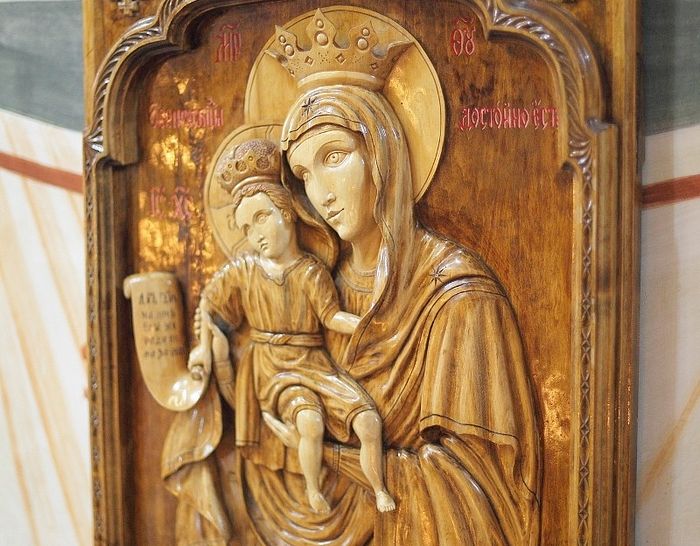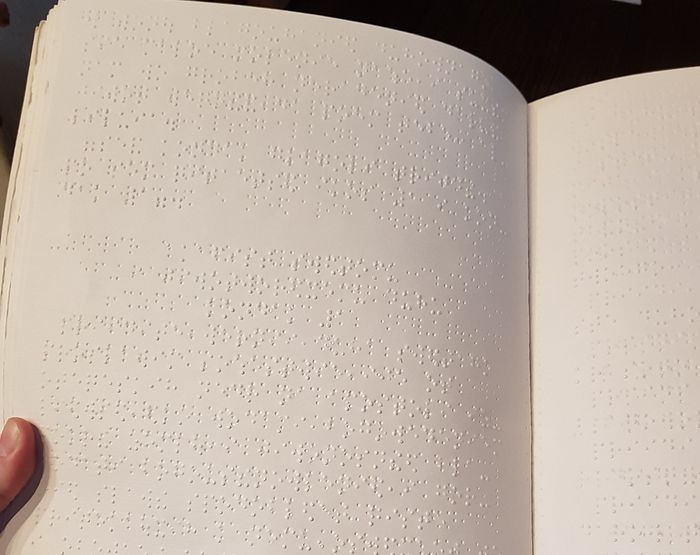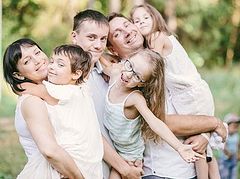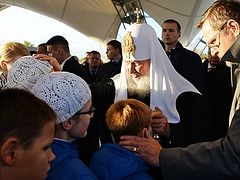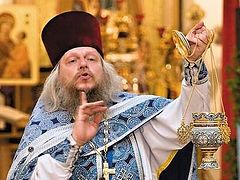Director of the Federal State Budget-Financed Institution, Boarding Home for Deafblind Children Galina Konstantinovna Epifanova and rector of the Church of the Apparition of the Holy Theotokos to the Venerable Sergius of Radonezh at the boarding home Hieromonk Theophylact talk about how children at the boarding home of Sergiev Posad [a town about forty-three miles north-east of Moscow where the Holy Trinity-St. Sergius Lavra is situated] live, learn and pray.
Every day we communicate with each other. Both children and adults have to analyze quite a lot of information that they get from outside by seeing and hearing it. We teach our children to understand each other from their childhood, namely to listen and to hear, to interact with the world around them. In the Book of Genesis of the Old Testament we read about the extremely tall Tower of Babel built in a human arrogant attempt to reach heaven on their own, which God frustrated by making its builders speak different languages so that they could not understand one another. Thus people gave up their ambitious construction project, and then God scattered them all over the Earth. They forgot their kinship to each other and gradually formed different nations, cultures, languages, traditions and customs. There are currently between 2,500 and 7,000 languages spoken by the peoples living on our planet. All of us feel uncomfortable when we find ourselves surrounded by foreigners speaking in an unfamiliar language and we are unable to understand them. But we cannot do it without a dictionary or an interpreter. Then we resort to a nonverbal communication by means of gestures. And we feel profound satisfaction when we learn foreign languages and can little by little listen to, hear and understand an unfamiliar speech and speak a foreign language ourselves. This little victory opens up new possibilities.
So, there are up to 7,000 languages. But today we will talk about one special language. The world as we know it, which is filled with sounds and noise, faces and colors, is not accessible to everybody. There are many “perpetual foreigners” among us, and in order to understand them we need to close our eyes and ears and at least try to cross the road or peel potatoes for a few minutes. The life of deafblind people in the world of hearing-and-sighted people, or vice versa? Deafblind children are a different domain, a different reality, a different universe… It is also many years of a painstaking work of ingenious teachers who step by step bring these children closer to the understanding of the following: “I just cannot hear and see. But my life is filled with joy, interesting events and colors. I can do everything, I develop, I live. And I thank God for this every day.”
We will be talking about the Boarding Home for Deafblind Children in Sergiev Posad which is a unique place where children begin a new life and learn to overcome the difficulties that befell them.
A little history
The Boarding Home for Deafblind Children was established in Zagorsk [now Sergiev Posad) in 1962 by the government decree on the initiative of two outstanding psychologists Alexander Meshcheryakov and Ivan Sokolyansky.
In 1963, the boarding home received its first children. Then it was a small building that could accommodate up to fifty children. It was seemingly a drop in the ocean – the only and unique boarding home of this kind in the whole of the USSR! But, as is generally known, “a drop of water can wear away a stone”.
The history of the boarding home’s development can be loosely divided into two important phases. The period after 1963 onwards saw incredible scientific breakthroughs. The “Zagorsk Four” experiment was successfully carried out. It was an attempt to train four boarding home students who were totally deaf and blind at the Department of Psychology of Lomonosov Moscow State University. It was at that time that the program for the development, adaptation and education of deafblind children was carefully worked out by psychologists and educators. It is used to this day and has been very effective. The second, spiritual phase of the boarding home’s life began in 1990. Initially it was a tiny house chapel of three rooms within the boarding home itself. But in time the need for the building of a fully functional church was evident.
Thus in 2011 a new church was constructed on the territory of the boarding home. Currently the Divine Liturgy is celebrated daily there. In addition to obtaining secular knowledge, these children receive a spiritual education, which makes their lives fuller and more fulfilling in spite of their physical disabilities.
Galina Epifanova:
“Loving and helping children know the world and people better instead of pitying them”
—Galina Konstantinovna, what does the work with every child admitted to your boarding home begin with?
—When it comes to totally deaf and/or blind children, the first thing that we teach them regardless of their age is life skills. Almost all our children (and we have 200 of them) have families, parents. But even their parents feel as if they were from different planets. Unfortunately, without the necessary knowledge and skills of work with the deafblind it is very difficult for anyone to give them the main thing: to teach them to live in the world of space, objects, sounds, to explain them that there are days and nights. After all, not only is their method of absorption of information laborious, it is different a priori! Thus parents make the decision, which is difficult for them yet right for their handicapped children—they bring them to us.
—So, all your children have parents? Or some of them are orphans?
—We currently have 200 children. Three years ago fifty of them were orphans. Twenty-four of them have found their foster parents over this period, which is a great relief for us. Remarkably, foster parents or caretakers prefer to adopt older children who have already mastered some basic life skills such as orientation in space and time. Believe me, the skills that come easily with hearing and sighted children require a slow training and laborious work of deafblind children on a daily basis. Try and explain to a three-year-old deafblind child what a table is without any verbal, eye and voice contact. To put it mildly, it is not easy.
—The doors of your boarding home are open to children aged three to eighteen, right? How do your children get over the separation with their parents?
—Yes, we admit children from the age of three and they leave us at about the age of eighteen. Sometimes they continue their education at our center and stay here till the age of twenty-one.
They normally don’t worry much about their separation with parents… As a rule both parents and children get tired of their mutual lack of understanding. That is neither bad nor good; rather, that is natural, given the fact that they perceive this world in very different ways. Parents shouldn’t be afraid or ashamed of their state of fatigue; instead they should do something that will make their own and their children’s lives a little easier. Once children end up here, they come to realize that they are not alone, there are other children with the same problems around them, they are understood and cared for, and, most importantly, new possibilities present themselves—to know this world better through a daily, painstaking, careful work. Children are encouraged to work and take care of themselves. They learn to make their beds, to wash their underwear and socks; older children do shopping and learn to communicate with people outside the boarding home.
Some parents moved to our town after their children had been admitted here. They bought flats nearby. And these children are allowed to spend weekends with their parents or stay with them overnight during the week. But even in this situation many children say that they feel more comfortable and “more at home” at our center. “There is a familiar atmosphere here and everybody else is like me”. The parents become wiser, they rejoice at their children’s achievements rather than take offence.
—Do most of the children who come to your boarding home have congenital deaf-blindness?
—It depends. Most of them were born prematurely. However, premature birth is just a consequence of a pathology that prevents a baby from developing normally through the forty weeks of pregnancy. For example, not all our children have combined pathologies. There are children with a profound hearing impairment but mild vision loss, and vice versa. You can count our totally deafblind children on the fingers of one hand. Additionally, we have some children with cerebral palsy and development of speech disorders. The analysis of these and other factors allows us to form a more or less individual approach to each child’s development program – whether it should be a teaching and remedial program or a social and remedial one.
Of course, in some cases the parents that gave us their children afterwards disappeared for a very long time. Sometimes we have to search for their relatives ourselves.
Indeed in some cases the blindness and/or deafness of one or another child were caused by domestic abuse. Some stories really make our hearts bleed—that is why one of our important tasks is to give love to these children and bring them joy so that they can avoid fear, spite and pain.
—Can you describe a typical day in the life of your children?
—One of the key moments is the daily routine, the rhythm of our daily life. Every child should be kept busy doing something. A strict schedule helps deafblind children judge time. For instance, if a child asks about dinner time, we enumerate all the actions from the schedule preceding dinner. There is a bedside-table next to each child’s bed with small toys denoting various items (a toothbrush, a cup etc.) laid on them in a specific order. When a child wakes up, he comes upon a toothbrush and understands that he should start his morning routine (washing his face, brushing his teeth etc.). He puts the toy toothbrush into a special tiny bag that he carries with him in order to understand what has already been done and to remind himself what his next task is. Then he finds a toy cup and prepares for breakfast, and so on. Children are taught to play, to interact with each other, to understand and feel those who are close to them. These are vital living skills. In addition to the school syllabus (they start it at the age of eight), our children sing (we have our own musical ensemble) and work at our workshops (modelling, weaving, sewing), draw, walk, and engage in creative activities.
For many of them singing is not a mere hobby, it is a lucky ticket to an independent adult life. Some of our children have wonderful voices and sing in our church choir. We tell them that they will always be able to work as choristers in the church – they are obtaining a good, useful profession.
—Was your church built especially for the boarding home’s children? How did you come to believe in God?
—I will start with the second part of this question. I grew up in the Soviet era, was an active USSR citizen and a Komsomol member. Yet I always knew that God exists. I never denied this and was never opposed to the Church. When I was a student I would visit the Lavra for a quick prayer occasionally. I would light a candle, stand, listen to the service—and my soul would rejoice. And twenty-one years ago my granddaughter was born. My daughter had preterm labor, and it was then that I was faced with the terror and fear of losing the person who was the most precious to me. The first thing I did was to rush to the church. I prayed like never before! As I was praying, I firmly believed that the Lord was listening to me. And the Creator answered our prayers! I have not imagined my life without the Church ever since.
In the early 1990s our children’s home was expanded and so we moved to the current building. More and more people discovered us and became interested in us, including other Church denominations. At first people from the former Simonov Monastery in Moscow, which has an Orthodox deaf community, visited us. Catholics and Protestants visited as well. But these were, as it were, “get-to-know-you visits”, a kind of sharing of experience. But this activity gradually came to naught. In time we came to realize that we needed our own church, our own priest—somebody who could hear our children’s confessions and give them Holy Communion on a regular basis. And a house church in honor of the Venerable Sergius of Radonezh was opened in the boarding home’s building through the efforts of alumni of the Moscow Theological Academy and Seminary and the icon-painting school graduates. And regular services began. It was a real blessing of God.
Later, through our donors’ support and with the blessing of the abbot of the Holy Trinity-St. Sergius Lavra the construction of a fully functional church on the territory of our center commenced.
In the course of the construction work it occurred to us to build a lower baptistery on the ground floor in honor of St. Luke (Voino-Yasenetsky) of Simferopol, who was a great surgeon but lost his eyesight at the end of his life. And on September 6, 2011, the Church of the Apparition of the Holy Theotokos to the Venerable Sergius celebrated its first patronal feast. The new church was opened not only for our children but also for people living nearby.
I am happy that in addition to the living skills, communication skills, knowledge, we help those under our care to develop spiritually. Faith is the best remedy for despair, despondency, and negative thinking. Children love church; they feel they are needed by God and His Holy Church. We, people of the sighted and hearing world, need them very much too. Every day we teach each other patience, compassion, love and mutual understanding. True, there are problems like the awkward age of our teenagers, which sometimes affects them more destructively than their healthy peers. But both we and they realize that we shouldn’t lose heart and must live on.
We go on tours with our musical ensemble, and people appreciate and invite us, which makes our children very happy.
—What is the longer-term future of those who leave you? What is in store for them in this world?
—The most important thing is that our children learn to live despite everything, despite the numerous challenges caused by their disability. Their life always involves overcoming difficulties; by the way, this is what we named our ensemble (“Overcoming” is “Preodolenie” in Russian). Some continue their education and acquire a profession, many of them master skills for sewing which is very useful for them in their lives. Many, as I said earlier, devote their lives to music. Now we are waiting for the building of a large rehabilitation center for the deafblind in our town, where those who leave us will be able to get jobs as teachers.
Having accumulated knowledge and mastered skills, they return to their families. By the way, quite a few of those who leave us later become parents of healthy children themselves. Of course, none of us can avoid difficulties, but our “Overcoming” is stronger than any hardships.
—And what about your experiment? What were the fates of “the Zagorsk Four”?
—To put it in a nutshell, the experiment proved successful.
Yuri Alexandrovich Lerner (1946-2003) became a sculptor and worked at our center.
Sergei Alexeevich Sirotkin (b. 1949) became President of the European Deafblind Union, founder and President of the Elvira (called after his late wife) Association for the Social Protection of Deafblind Persons in Russia, and a Doctor of Philosophy.
Natalia Nikolaevna Korneeva (now Kralytova; b. 1950) is a wife and mother. She is also a Research Assistant of the Institute of Psychology in the Russian Academy of Sciences.
Alexander Vasilievich Suvorov (b. 1953) is a psychologist, philosopher, poet, professor, and Doctor of Psychology. He is President of the Community of the Families with Deaf-blindness, and Professor of Educational Anthropology at the University of Russian Academy of Education.
—Galina Konstantinovna, what lessons have your children taught you as an educator and a sighted-and-hearing person over your years at this center?
—From the first day of my work at the boarding home I realized that I must love these children with special needs and regard them as normal children.
Loving and helping children know the world and people better instead of pitying them—that is the best approach. Pity is a hindrance to their development.
Hieromonk Theophylact (Kirillov):
“There are no contradictions, no restrictions, no mocking, and no humiliations here”
Fr. Theophylact speaks slowly and in a low voice, he radiates peace and calmness. Sometimes he falls silent and becomes thoughtful, trying to choose right words about the deafblind children and teenagers – the main parishioners of his wonderful church for whom it was actually built.
—Fr. Theophylact, how long have you served at this church? Can you tell us about the children, about the specific rules that should be observed in it? I attended the Liturgy here with my children on two occasions, and the first thing that catches one’s eye in this space is that the church was purposefully built for kids. It is a “family church”, a “children’s church”—from the carved wooden crucifix of a child’s height to the warm, welcoming, inclusive atmosphere. The church meets all the needs of handicapped children: the disability access ramps, small child friendly candleholders…, and the open side-chapel in honor of the Blessed Matrona of Moscow is a miracle in itself!
—Yes, Anastasia, you are not the first to notice this. Even the townsfolk have nicknamed us “the children’s church”. We don’t object (smiles). Our children are our treasure and heritage. Our major task is to teach each child the Word of God, to create the atmosphere of participation. During our church services qualified interpreters translate them into sign language (for deaf and hard-of-hearing parishioners) and into tactile sign language (for deafblind parishioners). All the liturgical texts, the prayer-book, the Psalter and akathists have been transcribed for them into Braille [a system of writing for the blind consisting of raised dot patterns that can be interpreted by touch, each dot or group of dots representing a letter, numeral, or punctuation mark; named after the French educator Louis Braille (1809-1852), who was blind from the age of three and by the age of fifteen had developed this system, which was adopted two years after his death]. So the children “read” these texts with their fingers and do it very well. If a sighted person comes to our service he will hardly ever notice that the prayers for Holy Communion are read aloud in a clear, perfect voice by a poor-sighted or even blind boy who reads them with his fingertips! Beyond all doubt, it is a result of the herculean efforts of the teachers, tutors, and children. Our church has a large number of icons carved in wood, stone and alabaster. All of them hang lower than usual on the wall so that children can “see” them by touching. The iconostasis is another distinctive feature of our church. The Royal Doors are low with windows on either side that enable the children to look inside the sanctuary. It is an extremely rare construction and you will hardly be able to find a “transparent” iconostasis like this anywhere else. The whole church, including this iconostasis, was built with the blessing of Archbishop Theognost of Sergiev Posad, Abbot of the Holy Trinity-St. Sergius Lavra.
It is important for each of the children to be self-fulfilled, including self-fulfillment in the Church. This self-fulfillment means that they feel needed, feel that their helping hand is important to their neighbors. Our tutors encourage mutual support among our children. Our children enter the church in line, holding each other’s shoulders. Hearing impaired children lead their visually impaired mates, who, in their turn, try to be helpful to those around them by reading and singing. This is the powerful school of love and life despite difficult situations. And the tutors are always near and ready to come to their aid.
And what one shouldn’t do at our church (we try to explain it over and over again and our permanent parishioners are aware of it) is attempt to help blind children by oneself. Since their organs of hearing and vision are inactive, it is compensated by oversensitivity to touch (also called sensory defensiveness). Thus, whenever an “outsider” touches or takes a child’s hand, he does it incorrectly. The child will react instantly: he may abruptly jerk back his hand or recoil from you. It is not because our children are aggressive; rather, it is because their sense of self-preservation is so strong and they are prone to trust only tutors or their own schoolmates. Therefore, once you see that a child has lost his bearings or started rushing about, please turn to one of our tutors. It is the best way you can help the children!
—Fr. Theophylact, will it be fair to say that these children are special, that they can see perfectly with their spiritual eyes despite being physically blind?
—We should be very cautious with these things. The Lord always blesses us with the things that we are prepared for and can use for our good. Spiritual vision is above all a heavy cross, and the Lord by His mercy doesn’t give it to those who are unprepared. Otherwise it may lead to sin and ruin.
Once we had the following phenomenon: A pillar began to “talk” with one of our boys! A priest sprinkled the pillar with holy water and it stopped “talking”. The boy was filled with indignation and began to pound on the pillar, crying: “Why are you silent?” It is clear that the evil spirits were trying to find an approach to the lad.
True, visually impaired children develop greater use of the other senses (for example, tactile ones) to compensate for that poor vision. At the same time, physical blindness by no means presupposes the vision of the spiritual world. We should understand that we are absolutely equal here. Of course, the Lord does perform miracles; let us recall chapter 9 of the Gospel of John where He heals a man born blind:
Jesus heard that they had cast him out; and when He had found him, He said unto him, Dost thou believe on the Son of God? He answered and said, Who is He, Lord, that I might believe on Him? And Jesus said unto him, Thou hast both seen Him, and it is He that talketh with thee. And he said, Lord, I believe. And he worshipped Him. And Jesus said, For judgment I am come into this world, that they which see not might see; and that they which see might be made blind. And some of the Pharisees which were with Him heard these words, and said unto Him, Are we blind also? Jesus said unto them, If ye were blind, ye should have no sin: but now ye say, We see; therefore your sin remaineth (Jn. 9:35-41).
This man’s spiritual eyes were opened when he was still physically blind. He was ready to receive healing; and the Lord delivered him from his bodily blindness as a continuation of his faith and humility for the glory of God.
—Do you ever see your children displeased or embittered? Do they ask this question: “Why am I not like others?”?
—No human feelings, emotions and worries are alien to our children. But over the years of my ministry here I have mostly observed their great gratitude to those around them. There is an atmosphere of “inherent gratitude”, as it were. They realize their state of dependence, that they need the help of sighted and hearing people. But this state of affairs teaches them to be compassionate and openhearted rather than embittering them.
—In your view, what is of paramount importance to your children?
—Attention and understanding are of primary importance. Material welfare and gifts are clearly of secondary importance. Keeping in touch with and being close to the people they trust is much more precious than any presents. For them just bar of chocolate alone is an occasion for celebration!
[Quite right! Today after the Liturgy Fr. Theophylact greeted two students of the boarding home: a current one (a boy who serves as an acolyte) and a former one—a man with an exceptional, deep voice timbre who comes to this church every week. Fr. Theophylact’s affection, his kind words and gestures made the faces of parishioners shine with joy. Of course, the children were treated to chocolates as well.—Auth.].
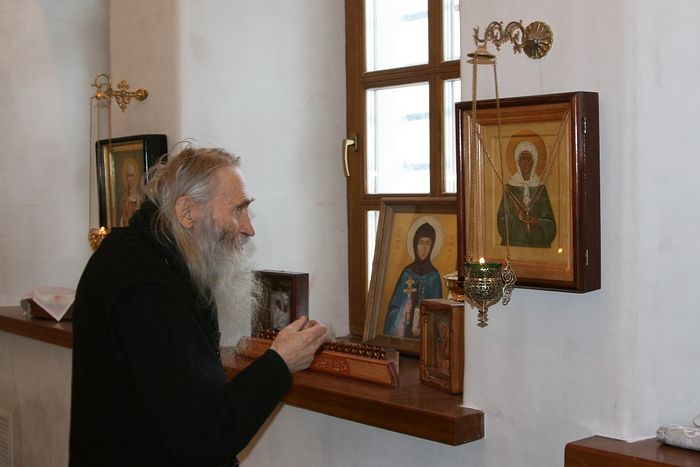 Schema-Archimandrite Iliy (Nozdrin) gives his blessing for the creation of a new side-altar dedicated to St. Matrona of Moscow.
Schema-Archimandrite Iliy (Nozdrin) gives his blessing for the creation of a new side-altar dedicated to St. Matrona of Moscow. —So, you and the boarding home’s administration have been closely cooperating, haven’t you?
—Certainly! Each of us has been contributing to the common cause. Whenever we have any disagreement to deal with, we make decisions for the benefit of those under our care. I can fully assure you that the children are like leaven that is rising. Galina Konstantinovna is truly a wonderful teacher and director, she is really the right person in the right place, and has a great deal of experience in the science of work with handicapped children. She has always been helping and supporting our staff, trying to make their lives better, and she is always ready to lend a helping hand in difficult life situations. In a word, she has been doing her best to ensure that the people enjoy their work and do it conscientiously. In my view, this is precisely what enables our boarding home to work successfully and efficiently.
—What do you think is the most important thing that children learn in your center?
—I believe that everything is vital. We have integrity of education here, namely the scientific and educational groundwork of the Soviet era, coupled with the spiritual education and instruction provided by the Orthodox Church. As for our practice, I think one of the best advantages of our center is that we never put emphasis on our children’s “inferiority”. First we teach them different kinds of activity, explain how all these things should be done and then ask them to reinforce the acquired knowledge by their independent work. At our center children are taught to live, and take responsibility for their acquired knowledge and for their actions. To my mind, that is extremely important! There is a Sunday school at our church where our children absorb living knowledge, study the Word of God, labor, engage in creative activities, and cooperate with sighted and hearing children. There are no contradictions, no restrictions, no mocking, and no humiliations here. We are all equal in God’s eyes, we are all brothers and sisters in Christ. Perhaps that is the most essential thing in our life!

